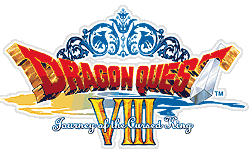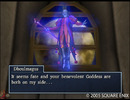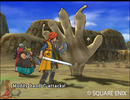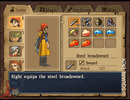|
|

|
PLATFORM
|
PS2
|
BATTLE SYSTEM
|

|
INTERACTION
|

|
ORIGINALITY
|

|
STORY
|

|
MUSIC & SOUND
|

|
VISUALS
|

|
CHALLENGE
|
Moderate
|
COMPLETION TIME
|
60-80 Hours
|
|
OVERALL

|
+ Solid game mechanics with lots of variety.
+ Great story with excellent script.
+ Nice music and graphics
- Retains franchise's archaic traditions.
- Clunky interface and control.
- Voice acting can be grating.
|
Click here for scoring definitions
|
|
|
An evil jester named Dhoulmagus steals a magic scepter in Trodain Castle, transforming all its inhabitants into plants and morphing the King and Princess into a troll and a horse respectively. A young guardsman from the castle manages to survive Dhoulmagus's sorcery, and pursues him in an attempt to defeat him and lift the curse. Square-Enix's Dragon Quest VIII: Journey of the Cursed King marked the transition of the long-running RPG franchise to the Playstation 2, preserving the classic gameplay of the series with some tweaks and featuring some significant additions to the North American version.
As in the eighth installment's predecessors, combat is randomly-encountered and turn-based, with the player's fixed party of up to four characters squaring off against a number of enemies. Combat follows the typical structure of most old-school turn-based battle systems: the player inputs all characters' commands (although it is possible to let the A.I. control the hero's allies), and they and the enemy execute their commands in a round. Though turn order supposedly depends upon agility, it nonetheless is random at times, allowing for occasional instances where the healing of characters low on HP comes too late.
Regardless, there are a number of twists to the franchise's typical turn-based combat, featuring the staple commands of attacking, defending, using items, using MP-consuming magic or skills (although some don't require any MP), and attempting to escape. For one, if the player's party is powerful enough, the party can "intimidate" the enemy to try and make them escape, and while the player won't gain experience or money from enemies intimidated away, they may drop treasure chests containing their normal or rare item drops (with the general rate of acquiring items from enemies being fairly low).
 The moon's by his side, as well
The moon's by his side, as well
|
|
Another twist is the Tension system, where each character is able to psyche up for a round, in which case their next attack will be more powerful than normal. Characters are able to psyche up to four levels of Tension, with this command working not only with normal attacks, but also many magic spells. Tension can actually be fairly useful with skills that hit a single enemy more than once or damage all enemies. However, it is occasionally possible for certain foes, mainly bosses, to completely cancel out Tension and other status buffs.
Winning a battle nets characters experience, money, and the occasional item drop. When characters level, their stats increase, and they gain a number of points the player can invest into various skill sets, including three different weapon types, fists, and a characteristic that varies from character to character (for instance, Courage for the protagonist). Once the player has invested enough points into a particular skill set, that character will gain a new skill or other addition, for instance an MP increase when equipped with a staff or increased critical rate for a specific weapon type.
Another feature is the Alchemy Pot, into which the player can put two (eventually up to three) items to create a new item. Creating items in this fashion requires the player to walk a certain distance, after which the player will acquire the new item. Players can find new recipes by reading books from bookshelves and rarely talking with NPCs, although many of these recipes will be incomplete and require players to find out on their own what the specific ingredients are, and sometimes, making the most of the Alchemy Pot can be difficult without a guide.
Players may also notice visible monsters wandering the overworld, which tend to be more powerful than average. Eventually, the player will gain the ability to recruit these monsters into teams of up to three monsters that the player can summon into combat to battle the enemy for a few rounds. Certain combinations of recruited monsters can yield special effects, such as being able to stay summoned for an additional round. It is also possible for the player's monster team to fight at a special monster arena for prizes and new monster team capabilities, such as the ability to hold more monsters.
 If your hand is bigger than your face, you have cancer
If your hand is bigger than your face, you have cancer
|
|
Overall, the battle system, in spite of its flaws, generally works well, with most fights flowing at a steady pace, and the difficulty generally being well-balanced, in spite of some occasional cheap shots on part of the enemy. If the party dies, the player loses half of the money they're currently carrying, although it is possible to put money into banks to largely nullify this penalty (and unlike previous Dragon Quests, all characters are revived when the player returns to a church after death). All in all, combat is solid and has plenty of variety.
The interface, however, could have been better. For one, the localization team decided to replace the traditional Dragon Quest menu system with a clunky graphical menu that doesn't flow very well, and the eighth installment retains the franchise's dated conventions such as merchants barraging the player with endless dialogue and confirmations while shopping. If the player is clueless on how to advance, they can converse with the party to get some hints on how to advance, though these can be slightly vague and unhelpful at times. Luckily, though, series conventions such as instant dungeon-exiting and warp magic are present. Even so, the game's control scheme is still one of its weak points.
Dragon Quest VIII retains many conventions that define its predecessors, such as Akira Toriyama's art and turn-based combat, and even borrows a little from other RPGs like Diablo II (the skill point system) and the Star Ocean games (item creation). The story is also somewhat reminiscent of that in The Legend of Zelda: A Link to the Past, and bears references to the third Dragon Quest. Still, the game's overworld is perhaps one of the largest in the RPG genre, and the story does have some unique elements, particularly with respect to the scepter Dhoulmagus steals. All in all, the eighth installment is by no means an inventive game, but nonetheless feels distinct in its own right.
The story is actually pretty good for a Dragon Quest game, with a reasonably well-developed cast (with the post-game content actually adding more story) and some interesting events that occur in the latter part of the game. The script itself is particularly interesting, having an English flavor, although it does have some occasional errors, for instance, women sometimes being addressed as "sir." Furthermore, Dhoulmagus is somewhat forgotten late in the game, and the plot itself is thinly spread out at points, but it's nonetheless a decent driving factor.
 The interface is the low point of the game.
The interface is the low point of the game.
|
|
As with other Dragon Quests, Koichi Sugiyama composes the soundtrack, with most tracks in the North American version orchestrated, and generally sounding pleasant, although there are some minor disappointments here, such as the fact that the normal battle theme doesn't even last a minute before looping. The North American version also has voice acting, with all characters having some kind of accent, and while some voices are decent, others can be somewhat irritating. Even so, Dragon Quest VIII is still a decent-sounding game.
Level-5, for the most part, did an excellent job in the visual department, giving the eighth game the cel-shaded look present in most of the developer's games, with Akira Toriyama's character and monster designs very well coming to life, and the scenery looking mostly fantastic. Battles also ditch the first-person perspective present in the game's predecessors except while the player is inputting commands. There are some occasional bland spots in the scenery and mild graphical slowdown, but otherwise, Dragon Quest VIII is a fantastic-looking game.
Finally, the eighth installment is reasonably lengthy, taking somewhere from sixty to eighty hours to complete, though the post-game content, as well as tons of other sidequests, can easily boost playing time beyond that range. All in all, Dragon Quest VIII is a solid entry into the series, given its solid mechanics, great story, and nice music and graphics. However, it does retain the franchise's archaic traditions, made slightly worse by some of the localization changes, and the voice acting is in some cases an acquired taste, although these luckily don't detract too terribly from an otherwise enjoyable journey.
Review Archives
|









